Strategic Analysis of Trends and Scenario Planning for Hospitality
VerifiedAdded on 2022/12/26
|12
|3137
|69
Report
AI Summary
This report provides a comprehensive analysis of the hospitality industry, focusing on current trends and future scenarios. It examines market scope, segmentation, and size, along with key competitors. The report delves into various factors impacting the industry, including political, economic, social, technological, environmental, and legal aspects, using a PESTLE analysis framework. It identifies key trends such as digital guest experiences, contactless technology, personalization, sustainability, destination promotion, smart rooms, and influencer marketing. Furthermore, the report explores scenario planning, developing potential future scenarios like hi-tech rooms and sustainable hotels, offering insights into the evolving landscape of the hospitality sector and its strategic implications. The report is a valuable resource for understanding the industry's direction and preparing for future challenges and opportunities.
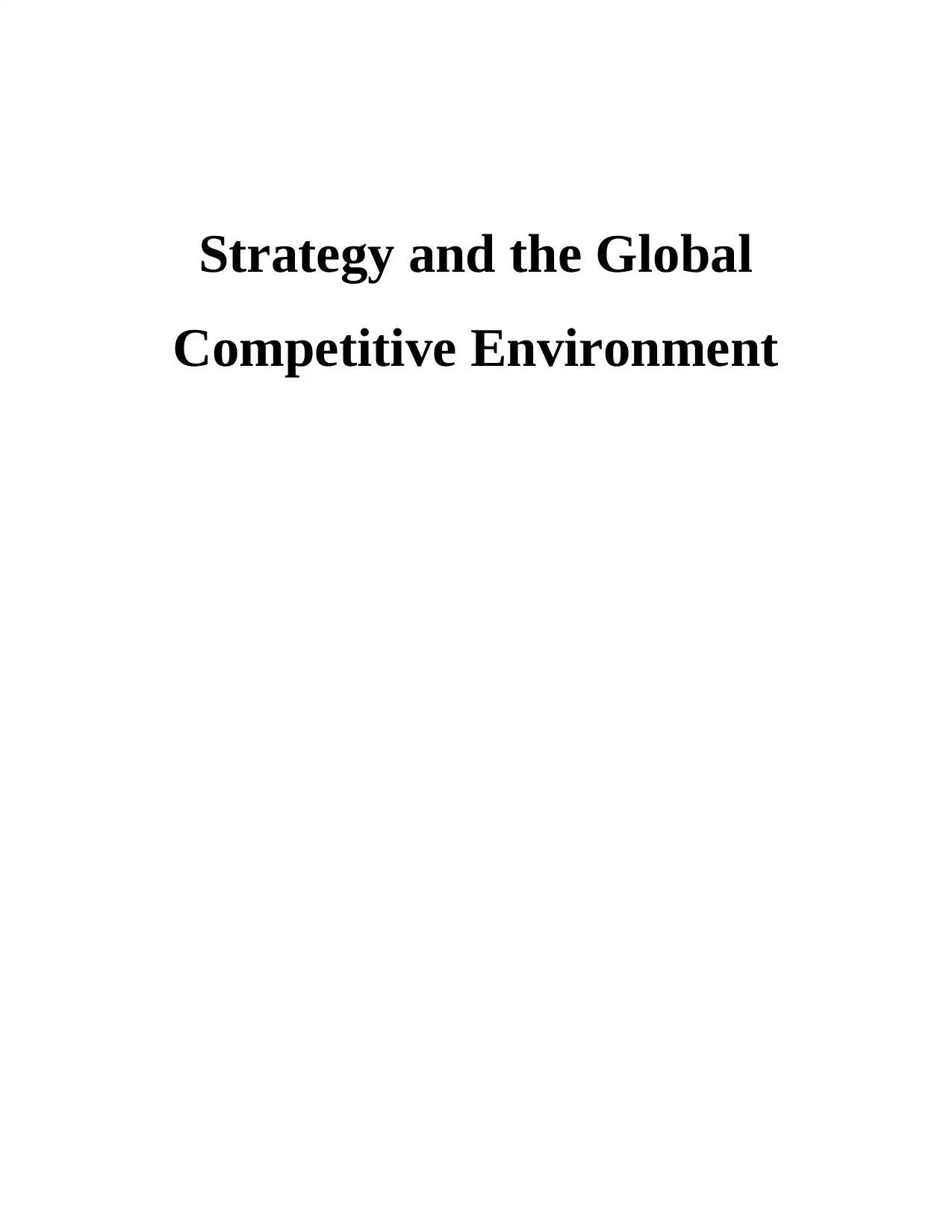
Strategy and the Global
Competitive Environment
Competitive Environment
Paraphrase This Document
Need a fresh take? Get an instant paraphrase of this document with our AI Paraphraser
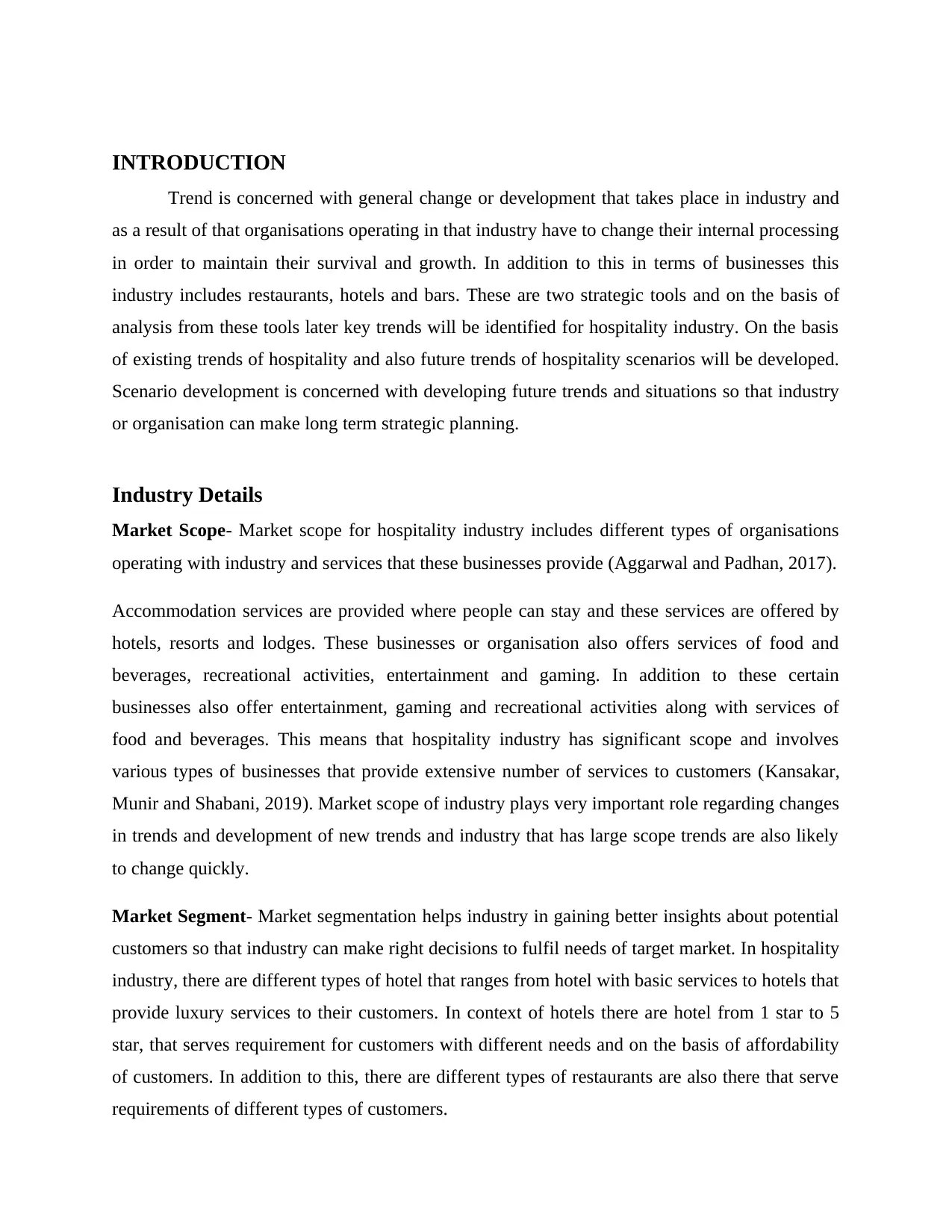
INTRODUCTION
Trend is concerned with general change or development that takes place in industry and
as a result of that organisations operating in that industry have to change their internal processing
in order to maintain their survival and growth. In addition to this in terms of businesses this
industry includes restaurants, hotels and bars. These are two strategic tools and on the basis of
analysis from these tools later key trends will be identified for hospitality industry. On the basis
of existing trends of hospitality and also future trends of hospitality scenarios will be developed.
Scenario development is concerned with developing future trends and situations so that industry
or organisation can make long term strategic planning.
Industry Details
Market Scope- Market scope for hospitality industry includes different types of organisations
operating with industry and services that these businesses provide (Aggarwal and Padhan, 2017).
Accommodation services are provided where people can stay and these services are offered by
hotels, resorts and lodges. These businesses or organisation also offers services of food and
beverages, recreational activities, entertainment and gaming. In addition to these certain
businesses also offer entertainment, gaming and recreational activities along with services of
food and beverages. This means that hospitality industry has significant scope and involves
various types of businesses that provide extensive number of services to customers (Kansakar,
Munir and Shabani, 2019). Market scope of industry plays very important role regarding changes
in trends and development of new trends and industry that has large scope trends are also likely
to change quickly.
Market Segment- Market segmentation helps industry in gaining better insights about potential
customers so that industry can make right decisions to fulfil needs of target market. In hospitality
industry, there are different types of hotel that ranges from hotel with basic services to hotels that
provide luxury services to their customers. In context of hotels there are hotel from 1 star to 5
star, that serves requirement for customers with different needs and on the basis of affordability
of customers. In addition to this, there are different types of restaurants are also there that serve
requirements of different types of customers.
Trend is concerned with general change or development that takes place in industry and
as a result of that organisations operating in that industry have to change their internal processing
in order to maintain their survival and growth. In addition to this in terms of businesses this
industry includes restaurants, hotels and bars. These are two strategic tools and on the basis of
analysis from these tools later key trends will be identified for hospitality industry. On the basis
of existing trends of hospitality and also future trends of hospitality scenarios will be developed.
Scenario development is concerned with developing future trends and situations so that industry
or organisation can make long term strategic planning.
Industry Details
Market Scope- Market scope for hospitality industry includes different types of organisations
operating with industry and services that these businesses provide (Aggarwal and Padhan, 2017).
Accommodation services are provided where people can stay and these services are offered by
hotels, resorts and lodges. These businesses or organisation also offers services of food and
beverages, recreational activities, entertainment and gaming. In addition to these certain
businesses also offer entertainment, gaming and recreational activities along with services of
food and beverages. This means that hospitality industry has significant scope and involves
various types of businesses that provide extensive number of services to customers (Kansakar,
Munir and Shabani, 2019). Market scope of industry plays very important role regarding changes
in trends and development of new trends and industry that has large scope trends are also likely
to change quickly.
Market Segment- Market segmentation helps industry in gaining better insights about potential
customers so that industry can make right decisions to fulfil needs of target market. In hospitality
industry, there are different types of hotel that ranges from hotel with basic services to hotels that
provide luxury services to their customers. In context of hotels there are hotel from 1 star to 5
star, that serves requirement for customers with different needs and on the basis of affordability
of customers. In addition to this, there are different types of restaurants are also there that serve
requirements of different types of customers.
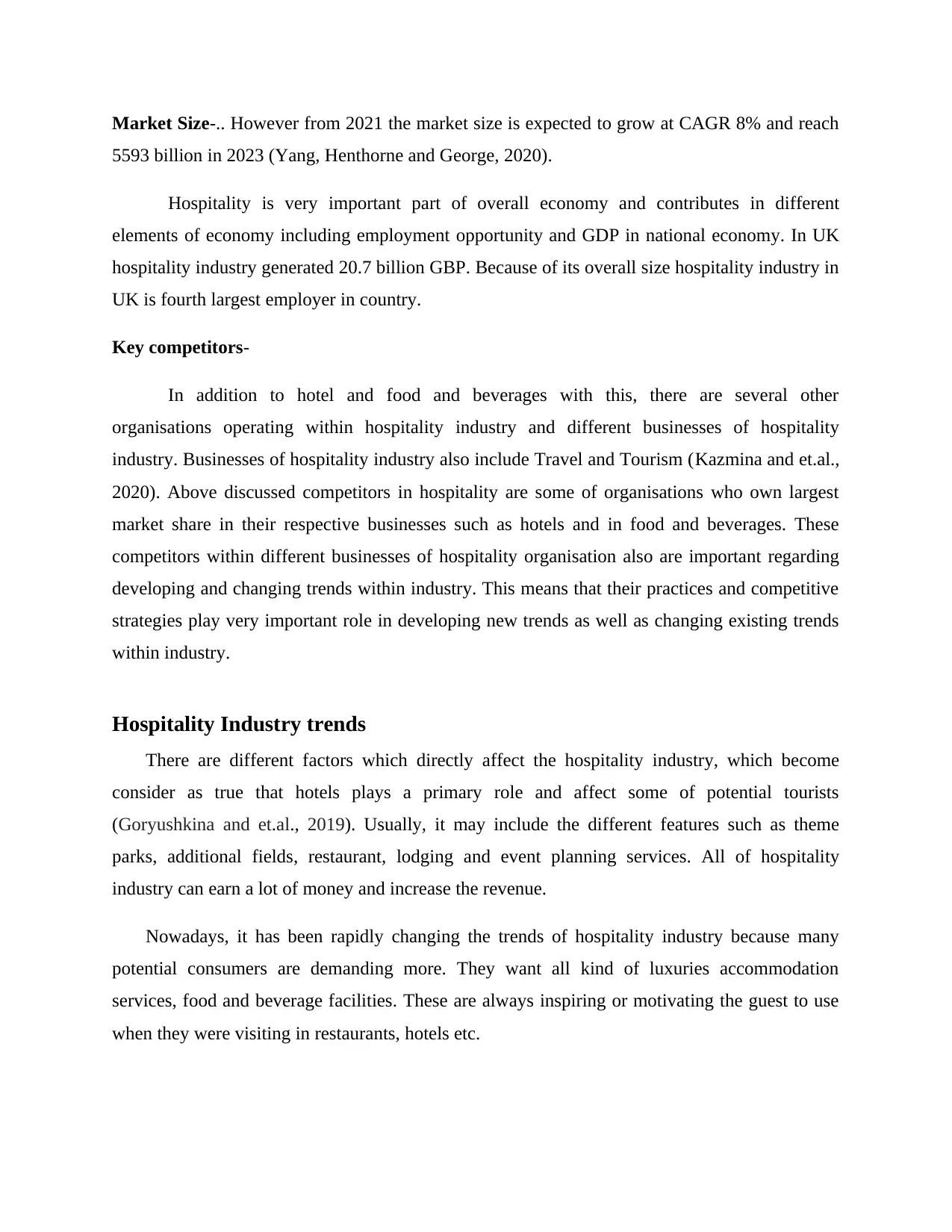
Market Size-.. However from 2021 the market size is expected to grow at CAGR 8% and reach
5593 billion in 2023 (Yang, Henthorne and George, 2020).
Hospitality is very important part of overall economy and contributes in different
elements of economy including employment opportunity and GDP in national economy. In UK
hospitality industry generated 20.7 billion GBP. Because of its overall size hospitality industry in
UK is fourth largest employer in country.
Key competitors-
In addition to hotel and food and beverages with this, there are several other
organisations operating within hospitality industry and different businesses of hospitality
industry. Businesses of hospitality industry also include Travel and Tourism (Kazmina and et.al.,
2020). Above discussed competitors in hospitality are some of organisations who own largest
market share in their respective businesses such as hotels and in food and beverages. These
competitors within different businesses of hospitality organisation also are important regarding
developing and changing trends within industry. This means that their practices and competitive
strategies play very important role in developing new trends as well as changing existing trends
within industry.
Hospitality Industry trends
There are different factors which directly affect the hospitality industry, which become
consider as true that hotels plays a primary role and affect some of potential tourists
(Goryushkina and et.al., 2019). Usually, it may include the different features such as theme
parks, additional fields, restaurant, lodging and event planning services. All of hospitality
industry can earn a lot of money and increase the revenue.
Nowadays, it has been rapidly changing the trends of hospitality industry because many
potential consumers are demanding more. They want all kind of luxuries accommodation
services, food and beverage facilities. These are always inspiring or motivating the guest to use
when they were visiting in restaurants, hotels etc.
5593 billion in 2023 (Yang, Henthorne and George, 2020).
Hospitality is very important part of overall economy and contributes in different
elements of economy including employment opportunity and GDP in national economy. In UK
hospitality industry generated 20.7 billion GBP. Because of its overall size hospitality industry in
UK is fourth largest employer in country.
Key competitors-
In addition to hotel and food and beverages with this, there are several other
organisations operating within hospitality industry and different businesses of hospitality
industry. Businesses of hospitality industry also include Travel and Tourism (Kazmina and et.al.,
2020). Above discussed competitors in hospitality are some of organisations who own largest
market share in their respective businesses such as hotels and in food and beverages. These
competitors within different businesses of hospitality organisation also are important regarding
developing and changing trends within industry. This means that their practices and competitive
strategies play very important role in developing new trends as well as changing existing trends
within industry.
Hospitality Industry trends
There are different factors which directly affect the hospitality industry, which become
consider as true that hotels plays a primary role and affect some of potential tourists
(Goryushkina and et.al., 2019). Usually, it may include the different features such as theme
parks, additional fields, restaurant, lodging and event planning services. All of hospitality
industry can earn a lot of money and increase the revenue.
Nowadays, it has been rapidly changing the trends of hospitality industry because many
potential consumers are demanding more. They want all kind of luxuries accommodation
services, food and beverage facilities. These are always inspiring or motivating the guest to use
when they were visiting in restaurants, hotels etc.
⊘ This is a preview!⊘
Do you want full access?
Subscribe today to unlock all pages.

Trusted by 1+ million students worldwide
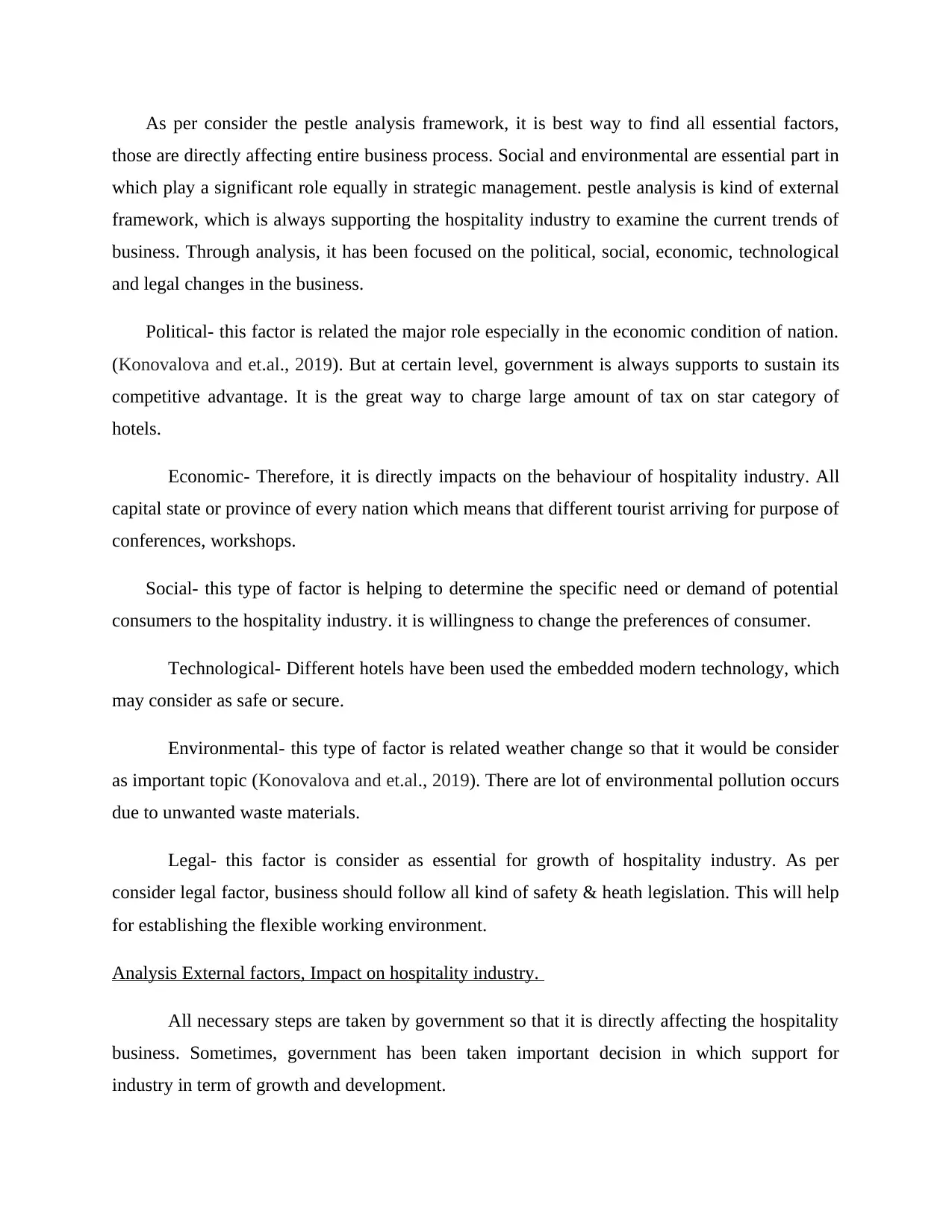
As per consider the pestle analysis framework, it is best way to find all essential factors,
those are directly affecting entire business process. Social and environmental are essential part in
which play a significant role equally in strategic management. pestle analysis is kind of external
framework, which is always supporting the hospitality industry to examine the current trends of
business. Through analysis, it has been focused on the political, social, economic, technological
and legal changes in the business.
Political- this factor is related the major role especially in the economic condition of nation.
(Konovalova and et.al., 2019). But at certain level, government is always supports to sustain its
competitive advantage. It is the great way to charge large amount of tax on star category of
hotels.
Economic- Therefore, it is directly impacts on the behaviour of hospitality industry. All
capital state or province of every nation which means that different tourist arriving for purpose of
conferences, workshops.
Social- this type of factor is helping to determine the specific need or demand of potential
consumers to the hospitality industry. it is willingness to change the preferences of consumer.
Technological- Different hotels have been used the embedded modern technology, which
may consider as safe or secure.
Environmental- this type of factor is related weather change so that it would be consider
as important topic (Konovalova and et.al., 2019). There are lot of environmental pollution occurs
due to unwanted waste materials.
Legal- this factor is consider as essential for growth of hospitality industry. As per
consider legal factor, business should follow all kind of safety & heath legislation. This will help
for establishing the flexible working environment.
Analysis External factors, Impact on hospitality industry.
All necessary steps are taken by government so that it is directly affecting the hospitality
business. Sometimes, government has been taken important decision in which support for
industry in term of growth and development.
those are directly affecting entire business process. Social and environmental are essential part in
which play a significant role equally in strategic management. pestle analysis is kind of external
framework, which is always supporting the hospitality industry to examine the current trends of
business. Through analysis, it has been focused on the political, social, economic, technological
and legal changes in the business.
Political- this factor is related the major role especially in the economic condition of nation.
(Konovalova and et.al., 2019). But at certain level, government is always supports to sustain its
competitive advantage. It is the great way to charge large amount of tax on star category of
hotels.
Economic- Therefore, it is directly impacts on the behaviour of hospitality industry. All
capital state or province of every nation which means that different tourist arriving for purpose of
conferences, workshops.
Social- this type of factor is helping to determine the specific need or demand of potential
consumers to the hospitality industry. it is willingness to change the preferences of consumer.
Technological- Different hotels have been used the embedded modern technology, which
may consider as safe or secure.
Environmental- this type of factor is related weather change so that it would be consider
as important topic (Konovalova and et.al., 2019). There are lot of environmental pollution occurs
due to unwanted waste materials.
Legal- this factor is consider as essential for growth of hospitality industry. As per
consider legal factor, business should follow all kind of safety & heath legislation. This will help
for establishing the flexible working environment.
Analysis External factors, Impact on hospitality industry.
All necessary steps are taken by government so that it is directly affecting the hospitality
business. Sometimes, government has been taken important decision in which support for
industry in term of growth and development.
Paraphrase This Document
Need a fresh take? Get an instant paraphrase of this document with our AI Paraphraser
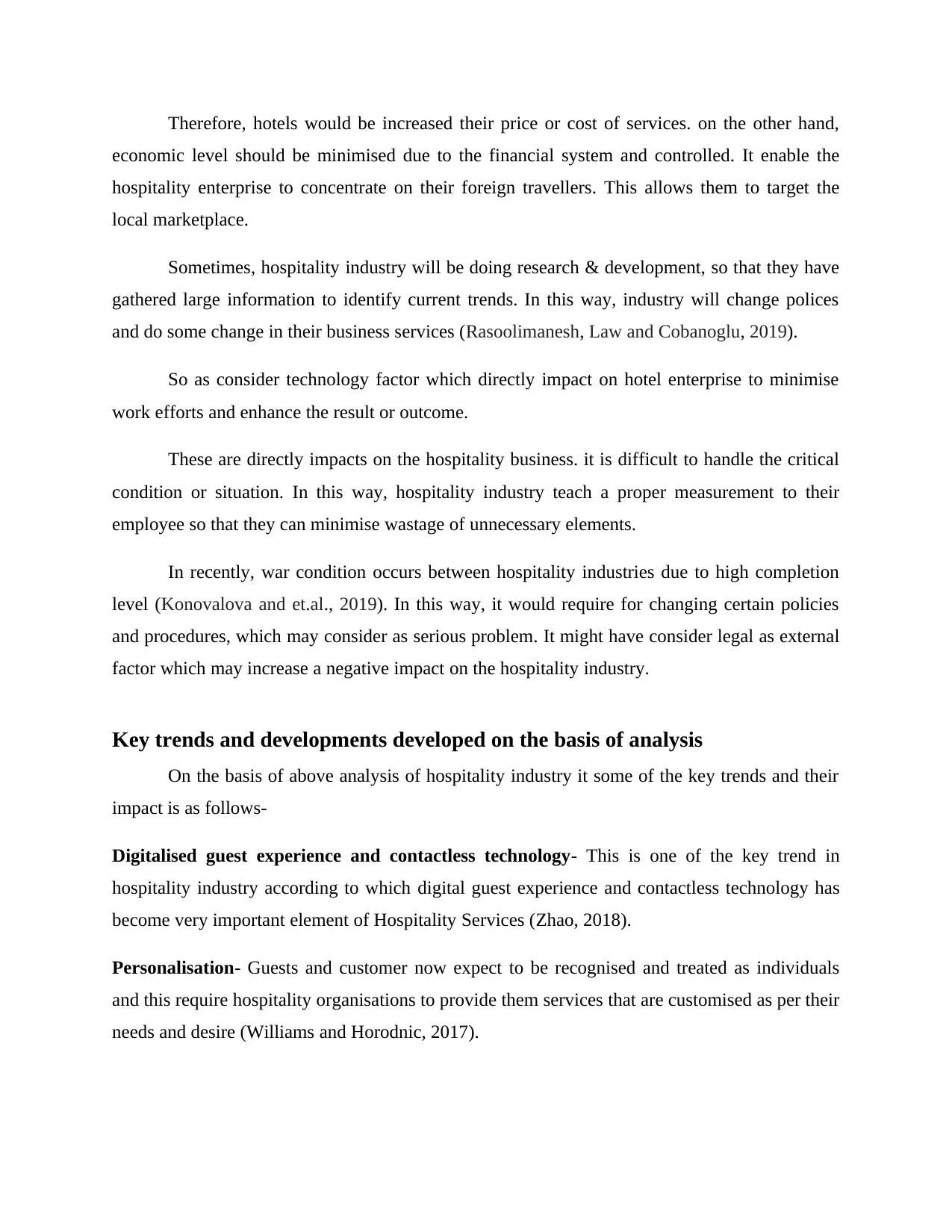
Therefore, hotels would be increased their price or cost of services. on the other hand,
economic level should be minimised due to the financial system and controlled. It enable the
hospitality enterprise to concentrate on their foreign travellers. This allows them to target the
local marketplace.
Sometimes, hospitality industry will be doing research & development, so that they have
gathered large information to identify current trends. In this way, industry will change polices
and do some change in their business services (Rasoolimanesh, Law and Cobanoglu, 2019).
So as consider technology factor which directly impact on hotel enterprise to minimise
work efforts and enhance the result or outcome.
These are directly impacts on the hospitality business. it is difficult to handle the critical
condition or situation. In this way, hospitality industry teach a proper measurement to their
employee so that they can minimise wastage of unnecessary elements.
In recently, war condition occurs between hospitality industries due to high completion
level (Konovalova and et.al., 2019). In this way, it would require for changing certain policies
and procedures, which may consider as serious problem. It might have consider legal as external
factor which may increase a negative impact on the hospitality industry.
Key trends and developments developed on the basis of analysis
On the basis of above analysis of hospitality industry it some of the key trends and their
impact is as follows-
Digitalised guest experience and contactless technology- This is one of the key trend in
hospitality industry according to which digital guest experience and contactless technology has
become very important element of Hospitality Services (Zhao, 2018).
Personalisation- Guests and customer now expect to be recognised and treated as individuals
and this require hospitality organisations to provide them services that are customised as per their
needs and desire (Williams and Horodnic, 2017).
economic level should be minimised due to the financial system and controlled. It enable the
hospitality enterprise to concentrate on their foreign travellers. This allows them to target the
local marketplace.
Sometimes, hospitality industry will be doing research & development, so that they have
gathered large information to identify current trends. In this way, industry will change polices
and do some change in their business services (Rasoolimanesh, Law and Cobanoglu, 2019).
So as consider technology factor which directly impact on hotel enterprise to minimise
work efforts and enhance the result or outcome.
These are directly impacts on the hospitality business. it is difficult to handle the critical
condition or situation. In this way, hospitality industry teach a proper measurement to their
employee so that they can minimise wastage of unnecessary elements.
In recently, war condition occurs between hospitality industries due to high completion
level (Konovalova and et.al., 2019). In this way, it would require for changing certain policies
and procedures, which may consider as serious problem. It might have consider legal as external
factor which may increase a negative impact on the hospitality industry.
Key trends and developments developed on the basis of analysis
On the basis of above analysis of hospitality industry it some of the key trends and their
impact is as follows-
Digitalised guest experience and contactless technology- This is one of the key trend in
hospitality industry according to which digital guest experience and contactless technology has
become very important element of Hospitality Services (Zhao, 2018).
Personalisation- Guests and customer now expect to be recognised and treated as individuals
and this require hospitality organisations to provide them services that are customised as per their
needs and desire (Williams and Horodnic, 2017).
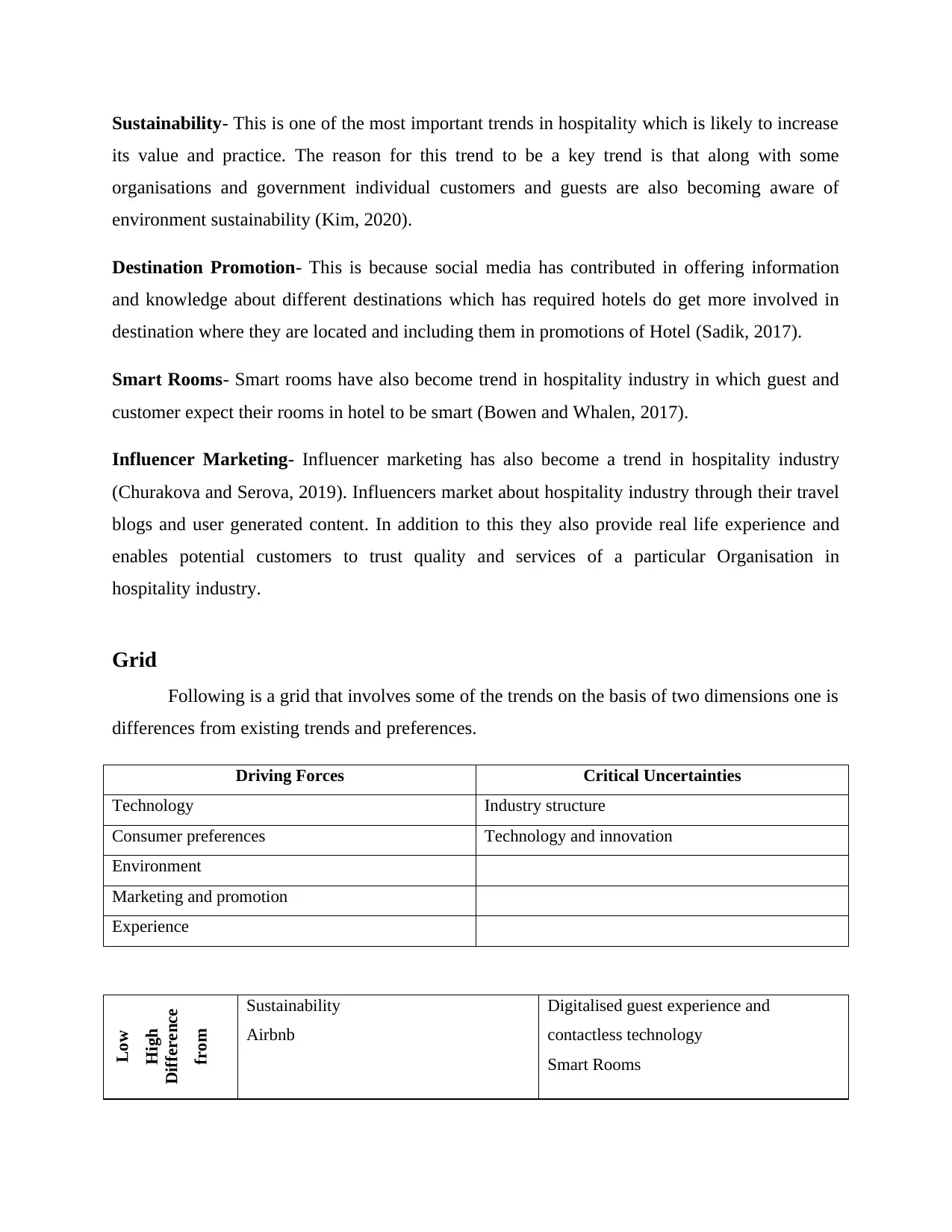
Sustainability- This is one of the most important trends in hospitality which is likely to increase
its value and practice. The reason for this trend to be a key trend is that along with some
organisations and government individual customers and guests are also becoming aware of
environment sustainability (Kim, 2020).
Destination Promotion- This is because social media has contributed in offering information
and knowledge about different destinations which has required hotels do get more involved in
destination where they are located and including them in promotions of Hotel (Sadik, 2017).
Smart Rooms- Smart rooms have also become trend in hospitality industry in which guest and
customer expect their rooms in hotel to be smart (Bowen and Whalen, 2017).
Influencer Marketing- Influencer marketing has also become a trend in hospitality industry
(Churakova and Serova, 2019). Influencers market about hospitality industry through their travel
blogs and user generated content. In addition to this they also provide real life experience and
enables potential customers to trust quality and services of a particular Organisation in
hospitality industry.
Grid
Following is a grid that involves some of the trends on the basis of two dimensions one is
differences from existing trends and preferences.
Driving Forces Critical Uncertainties
Technology Industry structure
Consumer preferences Technology and innovation
Environment
Marketing and promotion
Experience
Low
High
Difference
from
Sustainability
Airbnb
Digitalised guest experience and
contactless technology
Smart Rooms
its value and practice. The reason for this trend to be a key trend is that along with some
organisations and government individual customers and guests are also becoming aware of
environment sustainability (Kim, 2020).
Destination Promotion- This is because social media has contributed in offering information
and knowledge about different destinations which has required hotels do get more involved in
destination where they are located and including them in promotions of Hotel (Sadik, 2017).
Smart Rooms- Smart rooms have also become trend in hospitality industry in which guest and
customer expect their rooms in hotel to be smart (Bowen and Whalen, 2017).
Influencer Marketing- Influencer marketing has also become a trend in hospitality industry
(Churakova and Serova, 2019). Influencers market about hospitality industry through their travel
blogs and user generated content. In addition to this they also provide real life experience and
enables potential customers to trust quality and services of a particular Organisation in
hospitality industry.
Grid
Following is a grid that involves some of the trends on the basis of two dimensions one is
differences from existing trends and preferences.
Driving Forces Critical Uncertainties
Technology Industry structure
Consumer preferences Technology and innovation
Environment
Marketing and promotion
Experience
Low
High
Difference
from
Sustainability
Airbnb
Digitalised guest experience and
contactless technology
Smart Rooms
⊘ This is a preview!⊘
Do you want full access?
Subscribe today to unlock all pages.

Trusted by 1+ million students worldwide
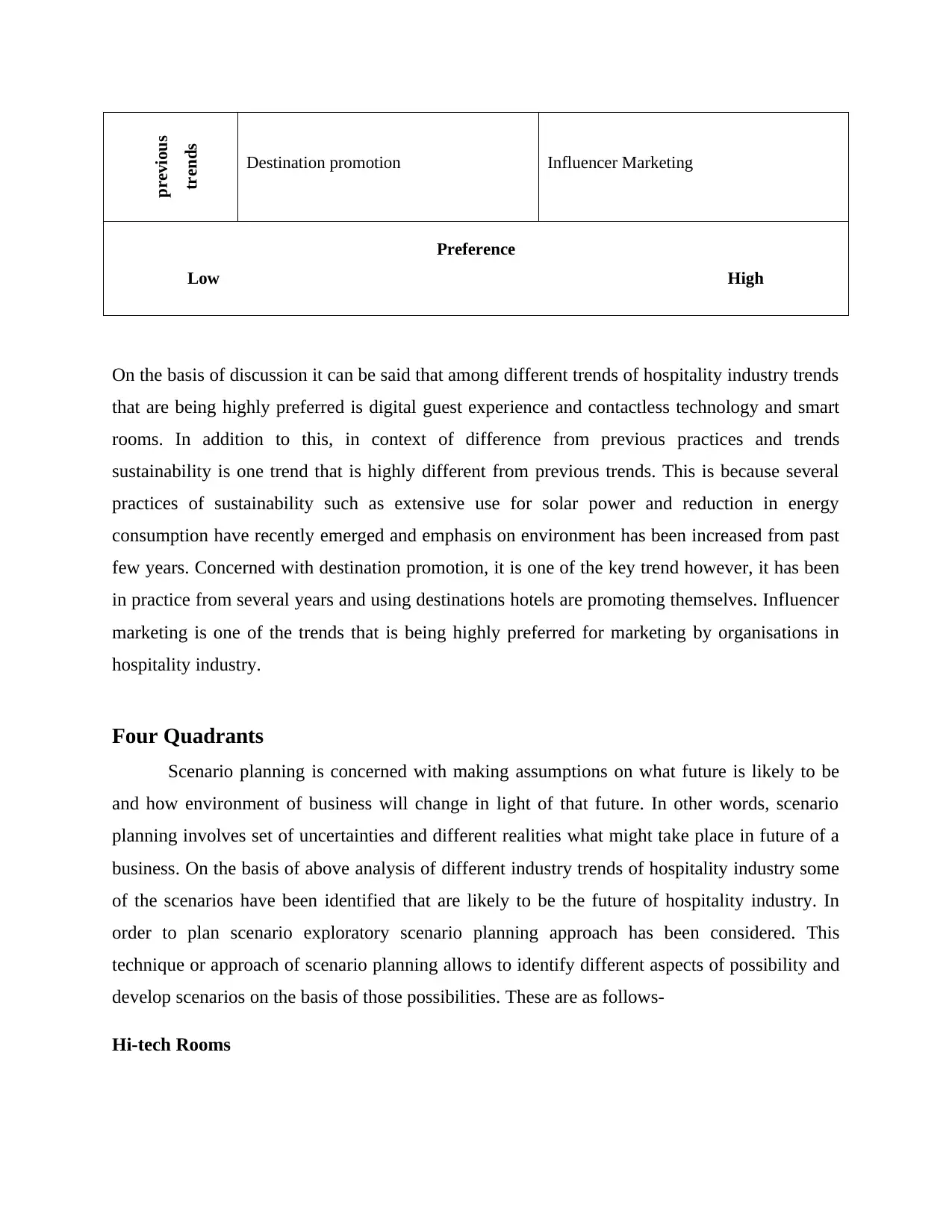
previous
trends
Destination promotion Influencer Marketing
Preference
Low High
On the basis of discussion it can be said that among different trends of hospitality industry trends
that are being highly preferred is digital guest experience and contactless technology and smart
rooms. In addition to this, in context of difference from previous practices and trends
sustainability is one trend that is highly different from previous trends. This is because several
practices of sustainability such as extensive use for solar power and reduction in energy
consumption have recently emerged and emphasis on environment has been increased from past
few years. Concerned with destination promotion, it is one of the key trend however, it has been
in practice from several years and using destinations hotels are promoting themselves. Influencer
marketing is one of the trends that is being highly preferred for marketing by organisations in
hospitality industry.
Four Quadrants
Scenario planning is concerned with making assumptions on what future is likely to be
and how environment of business will change in light of that future. In other words, scenario
planning involves set of uncertainties and different realities what might take place in future of a
business. On the basis of above analysis of different industry trends of hospitality industry some
of the scenarios have been identified that are likely to be the future of hospitality industry. In
order to plan scenario exploratory scenario planning approach has been considered. This
technique or approach of scenario planning allows to identify different aspects of possibility and
develop scenarios on the basis of those possibilities. These are as follows-
Hi-tech Rooms
trends
Destination promotion Influencer Marketing
Preference
Low High
On the basis of discussion it can be said that among different trends of hospitality industry trends
that are being highly preferred is digital guest experience and contactless technology and smart
rooms. In addition to this, in context of difference from previous practices and trends
sustainability is one trend that is highly different from previous trends. This is because several
practices of sustainability such as extensive use for solar power and reduction in energy
consumption have recently emerged and emphasis on environment has been increased from past
few years. Concerned with destination promotion, it is one of the key trend however, it has been
in practice from several years and using destinations hotels are promoting themselves. Influencer
marketing is one of the trends that is being highly preferred for marketing by organisations in
hospitality industry.
Four Quadrants
Scenario planning is concerned with making assumptions on what future is likely to be
and how environment of business will change in light of that future. In other words, scenario
planning involves set of uncertainties and different realities what might take place in future of a
business. On the basis of above analysis of different industry trends of hospitality industry some
of the scenarios have been identified that are likely to be the future of hospitality industry. In
order to plan scenario exploratory scenario planning approach has been considered. This
technique or approach of scenario planning allows to identify different aspects of possibility and
develop scenarios on the basis of those possibilities. These are as follows-
Hi-tech Rooms
Paraphrase This Document
Need a fresh take? Get an instant paraphrase of this document with our AI Paraphraser
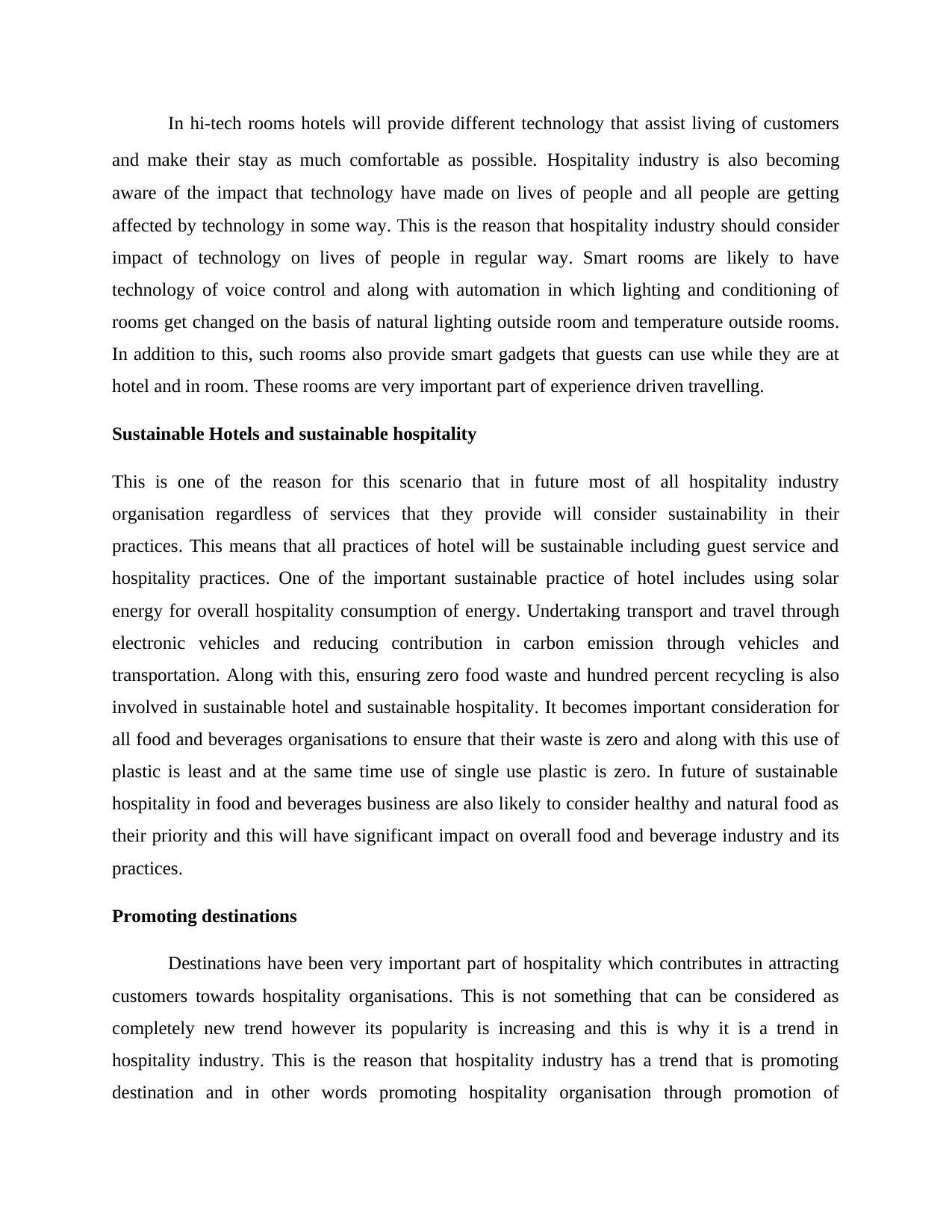
In hi-tech rooms hotels will provide different technology that assist living of customers
and make their stay as much comfortable as possible. Hospitality industry is also becoming
aware of the impact that technology have made on lives of people and all people are getting
affected by technology in some way. This is the reason that hospitality industry should consider
impact of technology on lives of people in regular way. Smart rooms are likely to have
technology of voice control and along with automation in which lighting and conditioning of
rooms get changed on the basis of natural lighting outside room and temperature outside rooms.
In addition to this, such rooms also provide smart gadgets that guests can use while they are at
hotel and in room. These rooms are very important part of experience driven travelling.
Sustainable Hotels and sustainable hospitality
This is one of the reason for this scenario that in future most of all hospitality industry
organisation regardless of services that they provide will consider sustainability in their
practices. This means that all practices of hotel will be sustainable including guest service and
hospitality practices. One of the important sustainable practice of hotel includes using solar
energy for overall hospitality consumption of energy. Undertaking transport and travel through
electronic vehicles and reducing contribution in carbon emission through vehicles and
transportation. Along with this, ensuring zero food waste and hundred percent recycling is also
involved in sustainable hotel and sustainable hospitality. It becomes important consideration for
all food and beverages organisations to ensure that their waste is zero and along with this use of
plastic is least and at the same time use of single use plastic is zero. In future of sustainable
hospitality in food and beverages business are also likely to consider healthy and natural food as
their priority and this will have significant impact on overall food and beverage industry and its
practices.
Promoting destinations
Destinations have been very important part of hospitality which contributes in attracting
customers towards hospitality organisations. This is not something that can be considered as
completely new trend however its popularity is increasing and this is why it is a trend in
hospitality industry. This is the reason that hospitality industry has a trend that is promoting
destination and in other words promoting hospitality organisation through promotion of
and make their stay as much comfortable as possible. Hospitality industry is also becoming
aware of the impact that technology have made on lives of people and all people are getting
affected by technology in some way. This is the reason that hospitality industry should consider
impact of technology on lives of people in regular way. Smart rooms are likely to have
technology of voice control and along with automation in which lighting and conditioning of
rooms get changed on the basis of natural lighting outside room and temperature outside rooms.
In addition to this, such rooms also provide smart gadgets that guests can use while they are at
hotel and in room. These rooms are very important part of experience driven travelling.
Sustainable Hotels and sustainable hospitality
This is one of the reason for this scenario that in future most of all hospitality industry
organisation regardless of services that they provide will consider sustainability in their
practices. This means that all practices of hotel will be sustainable including guest service and
hospitality practices. One of the important sustainable practice of hotel includes using solar
energy for overall hospitality consumption of energy. Undertaking transport and travel through
electronic vehicles and reducing contribution in carbon emission through vehicles and
transportation. Along with this, ensuring zero food waste and hundred percent recycling is also
involved in sustainable hotel and sustainable hospitality. It becomes important consideration for
all food and beverages organisations to ensure that their waste is zero and along with this use of
plastic is least and at the same time use of single use plastic is zero. In future of sustainable
hospitality in food and beverages business are also likely to consider healthy and natural food as
their priority and this will have significant impact on overall food and beverage industry and its
practices.
Promoting destinations
Destinations have been very important part of hospitality which contributes in attracting
customers towards hospitality organisations. This is not something that can be considered as
completely new trend however its popularity is increasing and this is why it is a trend in
hospitality industry. This is the reason that hospitality industry has a trend that is promoting
destination and in other words promoting hospitality organisation through promotion of
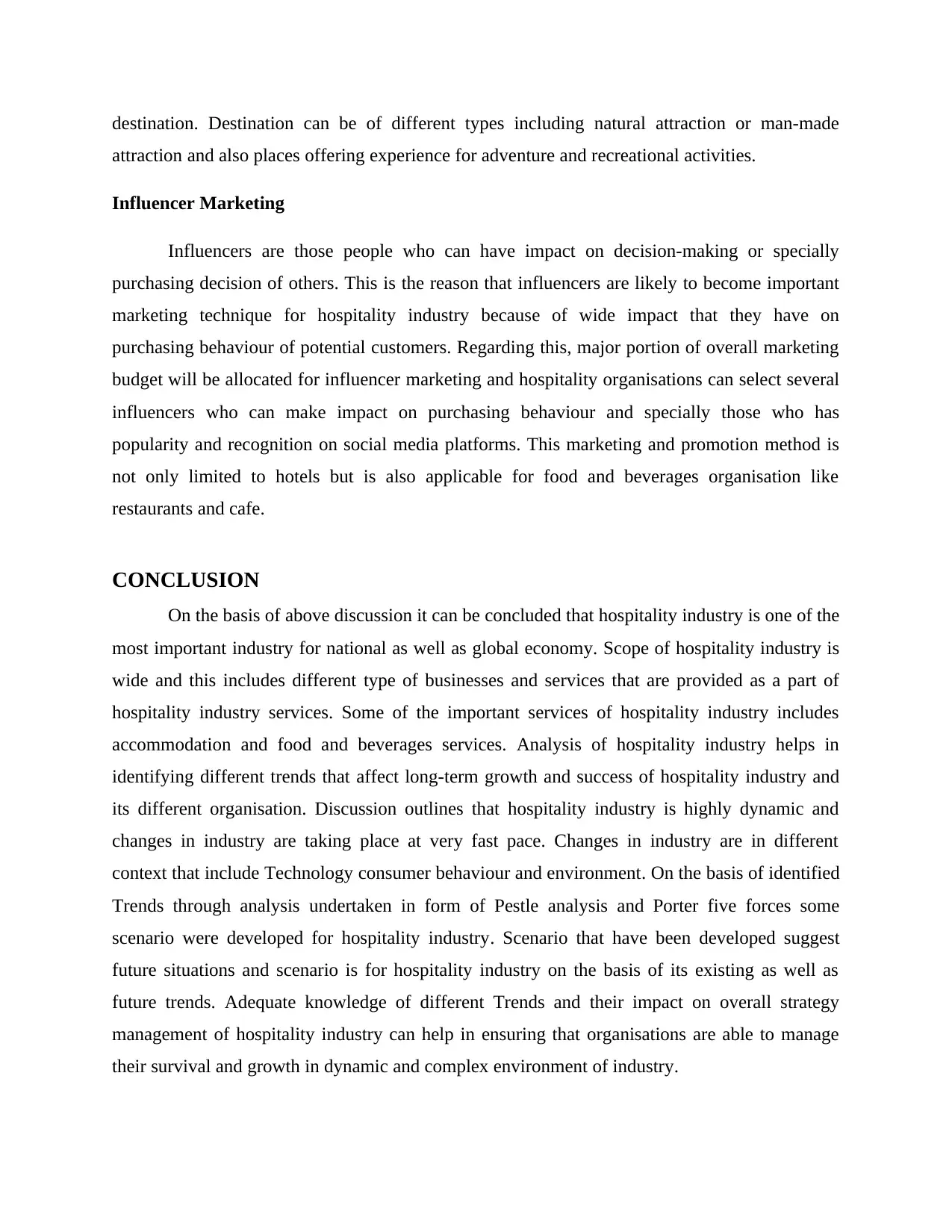
destination. Destination can be of different types including natural attraction or man-made
attraction and also places offering experience for adventure and recreational activities.
Influencer Marketing
Influencers are those people who can have impact on decision-making or specially
purchasing decision of others. This is the reason that influencers are likely to become important
marketing technique for hospitality industry because of wide impact that they have on
purchasing behaviour of potential customers. Regarding this, major portion of overall marketing
budget will be allocated for influencer marketing and hospitality organisations can select several
influencers who can make impact on purchasing behaviour and specially those who has
popularity and recognition on social media platforms. This marketing and promotion method is
not only limited to hotels but is also applicable for food and beverages organisation like
restaurants and cafe.
CONCLUSION
On the basis of above discussion it can be concluded that hospitality industry is one of the
most important industry for national as well as global economy. Scope of hospitality industry is
wide and this includes different type of businesses and services that are provided as a part of
hospitality industry services. Some of the important services of hospitality industry includes
accommodation and food and beverages services. Analysis of hospitality industry helps in
identifying different trends that affect long-term growth and success of hospitality industry and
its different organisation. Discussion outlines that hospitality industry is highly dynamic and
changes in industry are taking place at very fast pace. Changes in industry are in different
context that include Technology consumer behaviour and environment. On the basis of identified
Trends through analysis undertaken in form of Pestle analysis and Porter five forces some
scenario were developed for hospitality industry. Scenario that have been developed suggest
future situations and scenario is for hospitality industry on the basis of its existing as well as
future trends. Adequate knowledge of different Trends and their impact on overall strategy
management of hospitality industry can help in ensuring that organisations are able to manage
their survival and growth in dynamic and complex environment of industry.
attraction and also places offering experience for adventure and recreational activities.
Influencer Marketing
Influencers are those people who can have impact on decision-making or specially
purchasing decision of others. This is the reason that influencers are likely to become important
marketing technique for hospitality industry because of wide impact that they have on
purchasing behaviour of potential customers. Regarding this, major portion of overall marketing
budget will be allocated for influencer marketing and hospitality organisations can select several
influencers who can make impact on purchasing behaviour and specially those who has
popularity and recognition on social media platforms. This marketing and promotion method is
not only limited to hotels but is also applicable for food and beverages organisation like
restaurants and cafe.
CONCLUSION
On the basis of above discussion it can be concluded that hospitality industry is one of the
most important industry for national as well as global economy. Scope of hospitality industry is
wide and this includes different type of businesses and services that are provided as a part of
hospitality industry services. Some of the important services of hospitality industry includes
accommodation and food and beverages services. Analysis of hospitality industry helps in
identifying different trends that affect long-term growth and success of hospitality industry and
its different organisation. Discussion outlines that hospitality industry is highly dynamic and
changes in industry are taking place at very fast pace. Changes in industry are in different
context that include Technology consumer behaviour and environment. On the basis of identified
Trends through analysis undertaken in form of Pestle analysis and Porter five forces some
scenario were developed for hospitality industry. Scenario that have been developed suggest
future situations and scenario is for hospitality industry on the basis of its existing as well as
future trends. Adequate knowledge of different Trends and their impact on overall strategy
management of hospitality industry can help in ensuring that organisations are able to manage
their survival and growth in dynamic and complex environment of industry.
⊘ This is a preview!⊘
Do you want full access?
Subscribe today to unlock all pages.

Trusted by 1+ million students worldwide

Paraphrase This Document
Need a fresh take? Get an instant paraphrase of this document with our AI Paraphraser
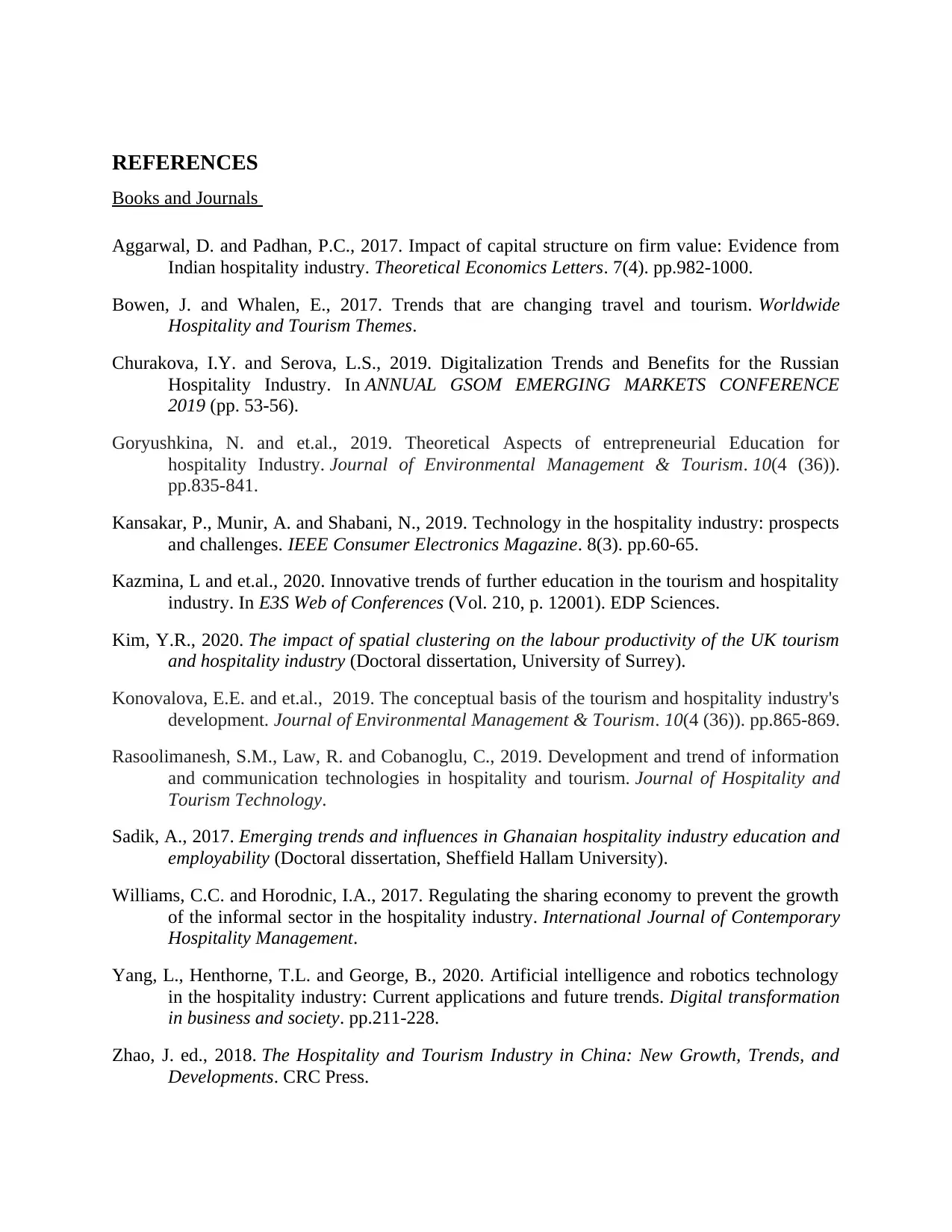
REFERENCES
Books and Journals
Aggarwal, D. and Padhan, P.C., 2017. Impact of capital structure on firm value: Evidence from
Indian hospitality industry. Theoretical Economics Letters. 7(4). pp.982-1000.
Bowen, J. and Whalen, E., 2017. Trends that are changing travel and tourism. Worldwide
Hospitality and Tourism Themes.
Churakova, I.Y. and Serova, L.S., 2019. Digitalization Trends and Benefits for the Russian
Hospitality Industry. In ANNUAL GSOM EMERGING MARKETS CONFERENCE
2019 (pp. 53-56).
Goryushkina, N. and et.al., 2019. Theoretical Aspects of entrepreneurial Education for
hospitality Industry. Journal of Environmental Management & Tourism. 10(4 (36)).
pp.835-841.
Kansakar, P., Munir, A. and Shabani, N., 2019. Technology in the hospitality industry: prospects
and challenges. IEEE Consumer Electronics Magazine. 8(3). pp.60-65.
Kazmina, L and et.al., 2020. Innovative trends of further education in the tourism and hospitality
industry. In E3S Web of Conferences (Vol. 210, p. 12001). EDP Sciences.
Kim, Y.R., 2020. The impact of spatial clustering on the labour productivity of the UK tourism
and hospitality industry (Doctoral dissertation, University of Surrey).
Konovalova, E.E. and et.al., 2019. The conceptual basis of the tourism and hospitality industry's
development. Journal of Environmental Management & Tourism. 10(4 (36)). pp.865-869.
Rasoolimanesh, S.M., Law, R. and Cobanoglu, C., 2019. Development and trend of information
and communication technologies in hospitality and tourism. Journal of Hospitality and
Tourism Technology.
Sadik, A., 2017. Emerging trends and influences in Ghanaian hospitality industry education and
employability (Doctoral dissertation, Sheffield Hallam University).
Williams, C.C. and Horodnic, I.A., 2017. Regulating the sharing economy to prevent the growth
of the informal sector in the hospitality industry. International Journal of Contemporary
Hospitality Management.
Yang, L., Henthorne, T.L. and George, B., 2020. Artificial intelligence and robotics technology
in the hospitality industry: Current applications and future trends. Digital transformation
in business and society. pp.211-228.
Zhao, J. ed., 2018. The Hospitality and Tourism Industry in China: New Growth, Trends, and
Developments. CRC Press.
Books and Journals
Aggarwal, D. and Padhan, P.C., 2017. Impact of capital structure on firm value: Evidence from
Indian hospitality industry. Theoretical Economics Letters. 7(4). pp.982-1000.
Bowen, J. and Whalen, E., 2017. Trends that are changing travel and tourism. Worldwide
Hospitality and Tourism Themes.
Churakova, I.Y. and Serova, L.S., 2019. Digitalization Trends and Benefits for the Russian
Hospitality Industry. In ANNUAL GSOM EMERGING MARKETS CONFERENCE
2019 (pp. 53-56).
Goryushkina, N. and et.al., 2019. Theoretical Aspects of entrepreneurial Education for
hospitality Industry. Journal of Environmental Management & Tourism. 10(4 (36)).
pp.835-841.
Kansakar, P., Munir, A. and Shabani, N., 2019. Technology in the hospitality industry: prospects
and challenges. IEEE Consumer Electronics Magazine. 8(3). pp.60-65.
Kazmina, L and et.al., 2020. Innovative trends of further education in the tourism and hospitality
industry. In E3S Web of Conferences (Vol. 210, p. 12001). EDP Sciences.
Kim, Y.R., 2020. The impact of spatial clustering on the labour productivity of the UK tourism
and hospitality industry (Doctoral dissertation, University of Surrey).
Konovalova, E.E. and et.al., 2019. The conceptual basis of the tourism and hospitality industry's
development. Journal of Environmental Management & Tourism. 10(4 (36)). pp.865-869.
Rasoolimanesh, S.M., Law, R. and Cobanoglu, C., 2019. Development and trend of information
and communication technologies in hospitality and tourism. Journal of Hospitality and
Tourism Technology.
Sadik, A., 2017. Emerging trends and influences in Ghanaian hospitality industry education and
employability (Doctoral dissertation, Sheffield Hallam University).
Williams, C.C. and Horodnic, I.A., 2017. Regulating the sharing economy to prevent the growth
of the informal sector in the hospitality industry. International Journal of Contemporary
Hospitality Management.
Yang, L., Henthorne, T.L. and George, B., 2020. Artificial intelligence and robotics technology
in the hospitality industry: Current applications and future trends. Digital transformation
in business and society. pp.211-228.
Zhao, J. ed., 2018. The Hospitality and Tourism Industry in China: New Growth, Trends, and
Developments. CRC Press.

⊘ This is a preview!⊘
Do you want full access?
Subscribe today to unlock all pages.

Trusted by 1+ million students worldwide
1 out of 12
Related Documents
Your All-in-One AI-Powered Toolkit for Academic Success.
+13062052269
info@desklib.com
Available 24*7 on WhatsApp / Email
![[object Object]](/_next/static/media/star-bottom.7253800d.svg)
Unlock your academic potential
Copyright © 2020–2026 A2Z Services. All Rights Reserved. Developed and managed by ZUCOL.





